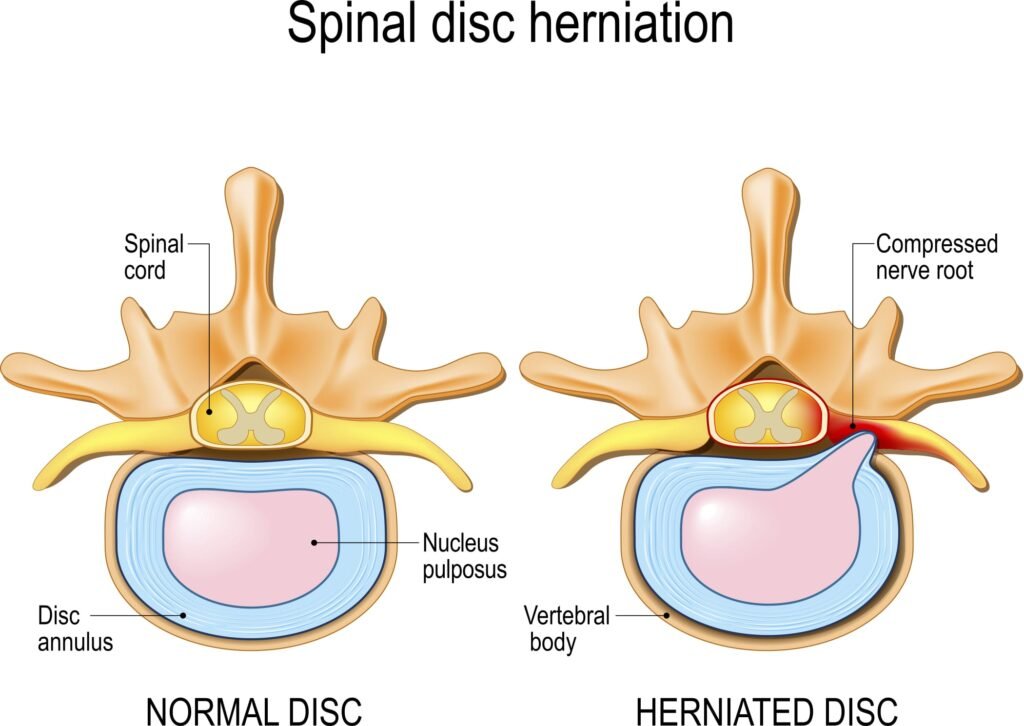
Disc Prolapse
It is also known as a slipped disc or herniated disc.
A herniated disc can occur anywhere in the spine but more
commonly affect the lumbar region of the spine.
The disc is a cushion-like structure that is placed between the vertebrae. It plays a very important role in the lower back and supports the upper body and allows movements in all directions.
Disc prolapse means when the nucleus ruptures out from the outer fibres and compresses the other structures that pass near the spine that causes severe pain in the lower back.
Slipped disc can be very painful or it can be asymptomatic.
Causes of slipped disc:
â— Due to the weakening outer fibrous layer, the inner part of the disc bulges out through the annulus fibrosus.
â— Trauma or injury to the annular of the disc due to full flexion of the spine for a repeat or pronged period.
â— Degeneration of the disc is related to ageing. The nucleus prolapsus becomes weakened as a human grows old and that may lead to disc herniation.
â— Trauma to the spinal vertebrae
â— Heavy weight lifting
â— A prolonged sitting job or sitting in the wrong posture for a longer period can cause rupturing of the fibrous layer of the disc.
â— Obesity
â— Tobacco abuse Symptoms:
Sudden onset of pain that can be severe and pain gets worse during movements of the back and subsides when lying still. Back pain is the characteristic symptom of a herniated disc.
Sciatica: the sciatic nerve is the commonest nerve that gets affected by disc prolapse. The sciatic nerve passes through the spinal cord and gets compressed by inflammation of the prolapsed disc. Pain in the lower back extends down to the back of thighs and calf. Pain can be severe and mild.
Other nerve pains: nerve compression can cause severe pain in the back or numbness of the buttock, legs, or foot. Symptoms depend upon which nerve has got compressed by a slipped disc.
Cauda equina syndrome: it is an emergency condition caused by prolapsed discs and if not treated on time it can cause severe conditions like paralysis etc.
Cauda equina is the bundle of the nerve root that passes through the lower end of the spinal cord that controls the pelvic organs or lower extremities.
Compression of these nerves causes dysfunction of pelvic organs and lower extremities.
â— Lower back pain.
â— Pain in the one side of the leg and numbness of glutes.
â— Urinary retention
â— Unable to controls the urination
â— Weakness of the lower extremities
â— Reduced reflexes of lower limbs.
â— Unable to control bowel movements
â— Constipation
â— Loss of anal tone and sensation.
Complications:
â— Pain gets severe while moving their back and it hampers
day-to-day activities.
â— Difficulty in passing urine and stool.
â— Loss of sensation from the lower extremities, especially in
thighs and legs. Diagnosis:
Imaging tests like:
â— CT scan and MRI: to diagnose the disc prolapse and to see the nerve involvement.
â— X-ray: it is not for the diagnosis of disc prolapse but it can be helpful to diagnose other conditions like tumours, the structure of the spine, or broken bone.
â— CT myelogram: computed tomography scan is to rule out the size and location of the bulged disc.
Homoeopathy management:
â— Aesculus hippocastanum: it is marked for back pain which unfits the person for the business. Pain in sacrum and hip and aggravated while walking or stooping. The spine feels too weak. Back and legs give out. Pain as if the back will break. Aching in the lumbar region and sacral region with stiffness in the back and unable to walk. The paralytic heaviness of arms, legs and feet.
â— Agaricus Muscarius: it is well marked in shooting burning pain along spines. The back is sensitive to touch pain as hot and cold needles are stabbed in the back. Stiffness of the muscles of the back as if they would break on bending.
â— Bryonia: Bryonia can be given to the back pain caused by over lifting or concussion. Severe painful back injuries get worse by motion. Slipped disc with sharp pain with the stiffness of the lumbar region. Pain in the back gets severe while walking or turning. Stiffness of the joints of the lumbar region, unable to walk and stooping and better by lying down.
â— Hypericum: Hypericum is well indicated for nerve pain that starts from the back and radiates down to the limbs. Coccyx pain radiating up to the spine and down to the limb. The compressed nerve of the spine causes sharp and violent pain and the inability to walk or stoop. It can be given in spinal concussion with the tenderness of the back and coccyx.